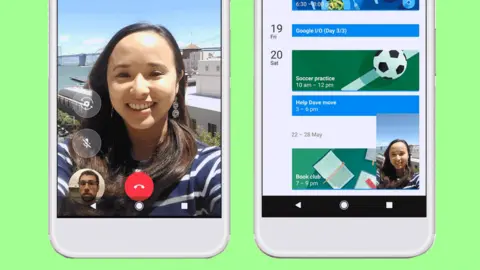Android Oreo released by Google
 Google
GoogleGoogle has released the latest version of its Android mobile operating system (OS), which is named after Oreo chocolate biscuits.
It adds a new "picture-in-picture" mode that lets some apps run in a small corner of the screen.
Google's own Nexus and Pixel phones are expected to be the first to receive the software update.
New versions of Android can be slow to roll out, and just 14% of Android devices run the previous OS, Nougat.
Android Oreo introduces measures to help people manage the volume of notifications on their devices, which has been described as "notification diarrhoea".
App developers will now be able to split notifications into categories, so people can block some types of alert while still receiving others.
Previously, Android users could only allow all or block all notifications from each app.
 Google
GoogleOther new features include:
- "smart copy-and-paste", which highlights an entire address, telephone number or web addresses when people try to copy it
- limiting how many system resources apps can use while they are running in the background, to reduce memory use and battery use
- Instant Apps, which lets some services invoke parts of their Android apps, even if people have not installed them
- a redesigned set of emojis, which look more like the ones seen on Apple's iOS
The picture-in-picture mode will let people watch YouTube videos in a corner of the screen while they use other apps, as long as they have paid for the YouTube Red subscription service.
 Google
GoogleHowever, people using Android Nougat can already watch YouTube videos in split-screen mode for free.
The software was released at 19:50 BST to coincide with a solar eclipse visible on the east coast of the United States.
It is now up to phone manufacturers to decide whether to make the new software available on their existing devices, although many do pre-install it on their new releases.
 Google
Google"Google's challenge with new versions of Android is that it's only immediately available to a small number of smartphone users," said Ian Fogg, of IHS Markit consultancy.
"Android typically needs to be adapted and approved by each handset maker and mobile operator, so it takes months for new versions of Android to reach a significant number of users.
"One key change in Android Oreo is in the architecture: to make it easier in the future for phone manufacturers to make their changes, but still push out new versions of the operating system to users.
"That's probably the most significant change."
